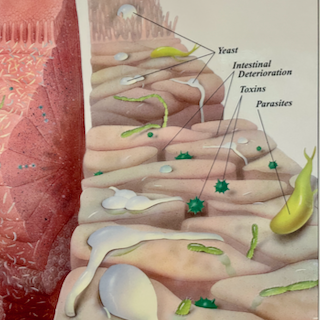What is Leaky Gut Syndrome?
To put it simply, Leaky Gut syndrome happens when large spaces (or holes) develop in the gut wall.
This allows bacteria, toxins, and food particles to leak into the bloodstream from the gut… hence its name “Leaky Gut”.
The definition of Leaky Gut Syndrome is an “increase in permeability of the intestinal mucosa to bigger molecules, antigens, and toxins associated with inflammatory degenerative and or atrophic mucosa or lining.”
Generally, the walls of a healthy gut allow very small molecules to pass through so that we can absorb nutrients.
A leaky gut occurs when tight junctions in the gut, which control what passes through the lining of the small intestine, don’t work properly.
This could allow unwanted bigger molecules such as food molecules, which are usually too large to pass through the intestinal barrier, to leak into the bloodstream.
Others pass through in the form of metabolic waste and microbial toxins.
When this happens, the immune system treats these foreign substances as antigens or nasties, setting off an allergic response in which antibodies are secreted in the bloodstream to couple with and immobilise these large molecules.
Let’s take a closer look at the Digestive Tract

The digestive tract is an elaborate system that involves organs from the mouth to the anus.
The small intestine performs an essential barrier function in keeping the body free from allergies.
The intestine’s membrane acts as a wall separating undigested food and the bloodstream. (The digestive tract organs properly break down food into smaller, usable molecules, which then are sent through the bloodstream to nourish the body’s tissues.)
When intact and healthy, the digestive tract organs break down food into smaller, usable molecules, which then are sent through the bloodstream to nourish the body’s tissues.
Some amount of wall permeability is common.
In people with a normal, intact gut, up to 20 percent of undigested protein can pass through the mucous membranes.
Excessively permeability causes problems.
When there is inflammation in the gastrointestinal mucosa, the intestinal wall becomes excessively permeable (lots of little gaps or holes form) leading to ‘leaky gut syndrome.
If bits of food have not been properly broken down due to imbalances in the digestive tract, food molecules, which are usually too large to pass through the intestinal barrier, slip through the gaps in the gut wall and enter the bloodstream.
When this happens, the immune system treats these foreign substances as antigens (antigens can cause food intolerance and/or allergies).
This sets off an allergic response in which antibodies are secreted in the bloodstream to bind with these foreign substances.
Leaky Gut Syndrome may cause the intestinal lining to become inflamed and the microvilli to become damaged or altered.
The damaged microvilli cannot then produce the enzymes and secretions that are essential for healthy digestion and the absorption of nutrients.
Leaky Gut Syndrome is a very common problem in modern society.

What could cause a Leaky Gut?
- Eating excessive amounts of inflammatory foods such as dairy, sugar, and alcohol.
- Gluten sensitivity.
- Use of antibiotics and non-steroidal anti-inflammatory drugs (NSAIDs).
- Infections such as candida, intestinal parasites, bacteria, fungi, protozoa, and small intestine bacterial overgrowth (SIBO).
- Other causes include enzyme deficiencies, toxins, mercury, alcohol, stress, and certain food intolerances.
Symptoms of Leaky Gut
Leaky gut symptoms are not unique. They’re shared by a range of problems. And tests often fail to uncover a definite cause of the problem.
Many are left without a diagnosis and, therefore, untreated, because a lot of the symptoms are quite common.
These symptoms include unexplained food intolerances and allergies, constipation, diarrhoea, wind, bloating, cramps, and heartburn as well as aches and pains.
Leaky Gut Syndrome has been directly linked to being a potential contributing factor in:
- ADD/ADHD
- Anxiety
- Asthma
- Autism
- Chronic Fatigue Syndrome
- Depression
- Eczema
- Fibromyalgia
- Food allergies
- Fungal disorders
- Irritable bowel syndrome
- Migraines
- Rheumatoid arthritis
- Sinusitis
- Type 1 diabetes
- Urticaria
Of course, there are natural ways to effectively treat this.
What we need to do now is to get your digestive system back on track.
Help you understand what Leaky Gut means and encourage you to follow the protocol and the diet set out for you.
If you would like more information, simply contact us at 9879 9596 or health@yourwellnesscentre.com.au to see how our naturopaths at Your Wellness Centre can support you along with your recovery.








Leave a Reply
Want to join the discussion?Feel free to contribute!